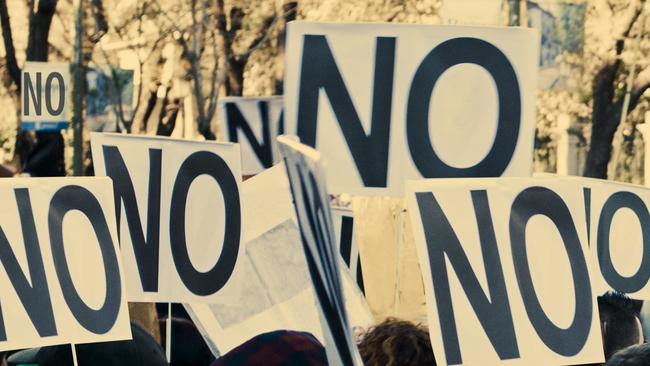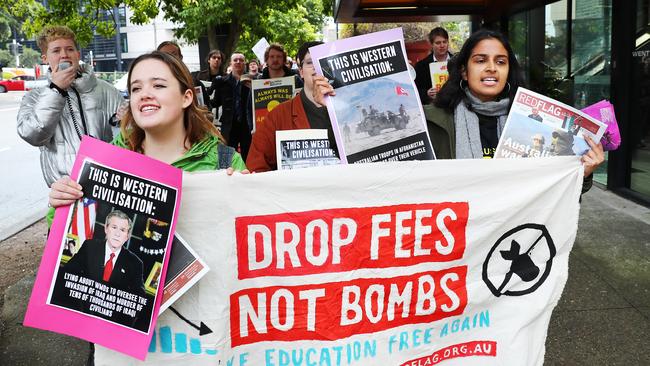A fragile culture of free speech
Universities should turn out resilient thinkers, not intolerant activists.

Are the vital spirits of campus life in decline? Do you go in fear of student activists whose offence radar is so sensitive it can detect white supremacy before “deplatformed” speakers open their mouths? With the blandest lecturers anxious not to perpetrate “nanoaggressions”, might this be the time to go foetal in your own “safe space”?
But there is a healthier option thanks to Jonathan Haidt, the social psychology doctor of crook campus culture. The New York University professor arrives in Melbourne on July 21 for a speaking tour. If you want to understand dysfunction in higher learning, the go-to book is The Coddling of the American Mind, which Haidt co-authored.
“From what many Australians have written to me already, I believe you have already caught ‘American disease’, even though your fever is several degrees lower than ours,” Haidt tells Inquirer. He has been crowd-sourcing evidence on “safetyism” in Australian schools, teen smartphone use, self-censorship on campus and suicide rates among the young; the links will become clear.
“Once university leadership validates the world view of the activist students, once it accepts their narrative in which education, like all activities, takes place within a vast and eternal zero-sum conflict among identity groups struggling for power and dominance, within which words are violence and deplatformings are necessary to protect the safety of some students, your temperature will rise.”

But we’re told there’s no crisis Down Under. Universities Australia struggled to see the need for a review of campus free speech when former High Court chief justice Robert French was given the job by Education Minister Dan Tehan last year. So, two welcome words in French’s April report gave UA its headline: “French review finds no campus free speech crisis.” Twitter rejoiced at this setback for Tehan: “No free speech crisis, who would’ve thunk?” French’s formula seems to be that a small number of outrages (think riot police at the University of Sydney), topped up with crazy stuff from the US, does not add up to a crisis here.
Former University of Melbourne vice-chancellor Glyn Davies rallied the sector around a similar defensive position last December. “Crisis talk has encouraged the Minister for Education to announce a review of free speech provisions, and to speculate about penalties for universities which fail some unspecified test,” he said.
“This turns out to be a small number of anecdotes repeatedly retold, warnings about trends in the US, implausible readings of university policies, and unsourced claims that staff and students feel oppressed.”
What the sector saw was culture war. In February, UA assured French that “a culture of lively debate and free expression of a wide array of ideas is very much in evidence on our campuses”. Two days later, education-minister-in-waiting Tanya Plibersek spoke in solidarity: “The Liberals and their allies in the hard-right think tanks … allege there’s some vast cultural Marxist conspiracy when some minor right-wing academic claims their freedom of speech has been impinged …”
But for French, no crisis did not mean no problem. He urged adoption of a model campus code with freedom of speech as a “paramount” value. The political context may have made this code seem more promising (to classical liberals) and more threatening (to defensive universities) than it will prove in practice. But now the rhetoric has cooled, a troika of university chancellors is happily tweaking the model code, and seemingly every second day a vice-chancellor lets fly with a declaration of freedom. The Coalition is still not simpatico, but campus administrators are in their element with codes, policies and guidelines, ideally leaving intact the centralised power of the modern corporate university.
It’s precisely this vast corpus of paper, with its sweeping terms, that French saw as a potential threat to campus freedom. Yet his own code is hedged around with limits and qualifications, some of which also seem useful to the power-hungry or paranoid administrator. For example, “the duty to foster the wellbeing of staff and students” prohibits “threatening or intimidating behaviour” but not “lawful speech” that offends, shocks or insults. This demarcation will be made in a university world imbued with “equity, diversity and inclusion” rules that sift language for traces of oppression, encourage the taking of offence, and prize victimology.
It’s true several chancellors have spoken up for freedom and French, the University of Western Australia’s chancellor, clearly thinks his model code can make a difference. This week, however, brought an analysis by two academics in The Conversation suggesting the code’s escape clauses may give university chiefs much the same control over freedom of expression as they now enjoy.
Hence the question that preoccupied Tony Jones on the ABC’s Q&A this week: surely Bible-quoting footballer Israel Folau would not become a fixture on campus? “What I’m saying,” Jones persisted, “is that the French review code actually gives the universities the right to say, ‘No, what he’s saying is going to hurt members of staff, possibly, and students, possibly, so he shouldn’t speak’.” Possibly.
So, “no crisis” is no solution. It has put the focus on the number of outrages, not the intellectual opportunity cost. For the odd “Nazi” speaker who’s deplatformed, how many other voices dissenting from progressive groupthink never appear on a campus invitation list? How many lecturers critical of activist “grievance studies” don’t get interviewed for posts? What fertile lines of inquiry into the achievements of Western civilisation are never pursued? Just ask the Ramsay Centre. It’s notable that this philanthropic venture, not one of our public universities, gave a platform to a stimulating lecture this month by British grievance studies hoaxer Helen Pluckrose.
Haidt knows the no-crisis mentality well. “In the US, those who want to deny that we have a major problem on campus tend to focus on the most spectacular events — the shout-downs and disinvitations — of which there are not many each year. But those are just the tip of a vast iceberg. The iceberg is the fear of being called out for expressing an idea or opinion in a social setting that used to value provocation, cleverness and originality but is now increasingly policed by a small number of students and faculty who use social media to make ad hominem attacks, rather than reasoned rebuttals.
“Talk to professors who are centre-left and who study topics that are suddenly ‘controversial’, such as intelligence, gender differences, evolution or immigration, and ask them if debate around these topics is normal and healthy. Look for gaps between what academics will say in public and what they say in private.”
The no-crisis stance directs attention to politics and rights, not culture and ideas. French’s report dwells on legal context and administrative remedies, although he warns that good rules will struggle in a closed culture. His terms of reference included helpful ideas overseas yet he makes no mention of the Heterodox Academy, which Haidt co-founded in New York in 2015. It campaigns for “viewpoint diversity”, whereas the diversity obsession of most universities is really identity politics. Haidt says honest learning and research can’t happen without a culture that enables the fertile interplay of differing viewpoints. He and other leaders of the movement are classical liberals, and they try to stay aloof from culture wars.
Stephen Chavura, one of the handful of Australian academics who went to New York for Heterodox’s June 20-21 conference, feels the French review has not come to grips with the university culture of censorship. A conservative historian, he teaches at Sydney’s Catholic Campion College but has worked at public universities.
“The reason the small vocal minority (of activists) feels so empowered is because universities have an underlying culture of left-wing ideology at the staff and bureaucratic level,” he says. “Many students over the years, not just where I’ve taught, have told me they didn’t feel comfortable contributing to discussion because the hostility to non-orthodox ideas seemed so palpable … many of them thought they might be penalised by their lecturers. Over the past 30 years the left has more or less replicated itself at the staff and administration level in universities to the point where they’re no longer held accountable … and the conservatives that are there, they know their place.” He thinks French’s model code worth pursuing but does not expect any swift unravelling of campus culture.
Psychology has a central role in this story. Haidt’s collaborator in the decoddling of campus minds is American lawyer Greg Lukianoff.
A decade ago he emerged from a suicidal depression thanks to cognitive behavioural therapy. This relatively simple technique has had great success in challenging flaws of thinking and logic that go with depression and anxiety. Lukianoff, a free speech advocate, began to see these cognitive glitches on campus. He recalls a diversity exercise where students were “made to ‘take a stance’ on one side of a room or another, displaying their personal views on polarising topics such as affirmative action and gay marriage”. There was no tolerance for uncertainty. “It’s a classic demonstration of the all-or-nothing thinking I had struggled with,” Lukianoff says.
Catastrophising and allowing feelings to override reason have also been on display after universities took in the first group of “anti-social media natives”, whose overanxious 1990s parents kept them “safe” from the toughening-up that comes with unsupervised outdoor play.
CBT has pride of place in the university curriculum yet administrators pandering to snowflake students have been unwittingly complicit in redoubling their sense of fragility. It’s science denialism. Hate speech has come to mean speech I hate. To hear the words of a dissenting opinion is tantamount to a physical assault and a suicide trigger, or so these students say. The concept of student safety has been stretched to the point of absurdity, in defiance of the psychological truth that avoidance of something feared only strengthens the phobia. Not a useful preparation for life’s challenges.
Why don’t vice-chancellors redirect some of the money lavished on their offence industry infrastructure to something undeniably good for student wellbeing: offer them training in CBT and other skills known to promote resilience? That won’t kill the dysfunctional culture overnight; it’s hard to uninvent the voodoo scholarship inspired by 1960-70s New Leftism. But the spread of CBT might give the French code a fighting chance.



To join the conversation, please log in. Don't have an account? Register
Join the conversation, you are commenting as Logout